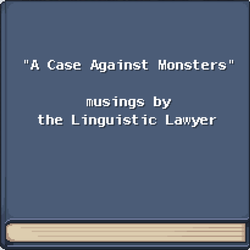A Case Against Monsters
A Case Against Monsters is a book found in Evergrind City's library.
Transcript
"You monster," said Lisa to her husband, who had eaten all the ice cream. Maybe if she stabbed him he would've dropped a card?
I'm joking of course, but the word "monster" has been a hot topic within all kinds of intellectual disciplines, including biology, philosophy and even physics.
"All monsters drop cards, and only monsters drop cards" said distinguished academic Carl van Liner. A simple enough definition: if something had been observed to drop a card, it could be called a monster! Otherwise, it was probably not.
A decade later, fellow philosopher and biologist Chuck Doorwin argued that there might be monsters out there that can not drop cards, yet in all other ways seem entirely similar to card-carrying monsters. He did, however, agree that only monsters drop cards".
As technology grew more precise, along came the physicists, eager to get their sticky fingers on the word and ruin it further.
Ishaq Oldton wrote: "Some living things, when they die, lose a large portion of their mass in an explosion - or poof. This characteristic is what separates a monster from an animal."
Many people embraced this view for a simple, comforting reason: since humans do not 'poof' upon death, it gives us a way out of the uncanny speculation around whether humans might be monsters, and with that the forbidden debate on whether a human might drop a card.
Since then, there have been a hundred refinements, dozens steps forward and just as many steps back.
My take? The real monstrosity in this story is how much time and effort has been spent trying to lay claim to this poor little two-syllable word!
musings by
the Linguistic Lawyer
Location
This book can be found in Evergrind City's library.
Trivia
- The names of the characters in the book relate to people in real life:
- Carl van Liner refers to Carl von Linné, a Swedish biologist and physician who formalized binomial nomenclature, the modern system of naming organisms.
- Chuck Doorwin refers to Charles Darwin, an English naturalist, geologist and biologist, widely known for his contributions to evolutionary biology.
- Ishaq Oldton refers to Isaac Newton, an English polymath active as a mathematician, physicist, astronomer, alchemist, theologian, and author who was described in his time as a natural philosopher.
- Books

